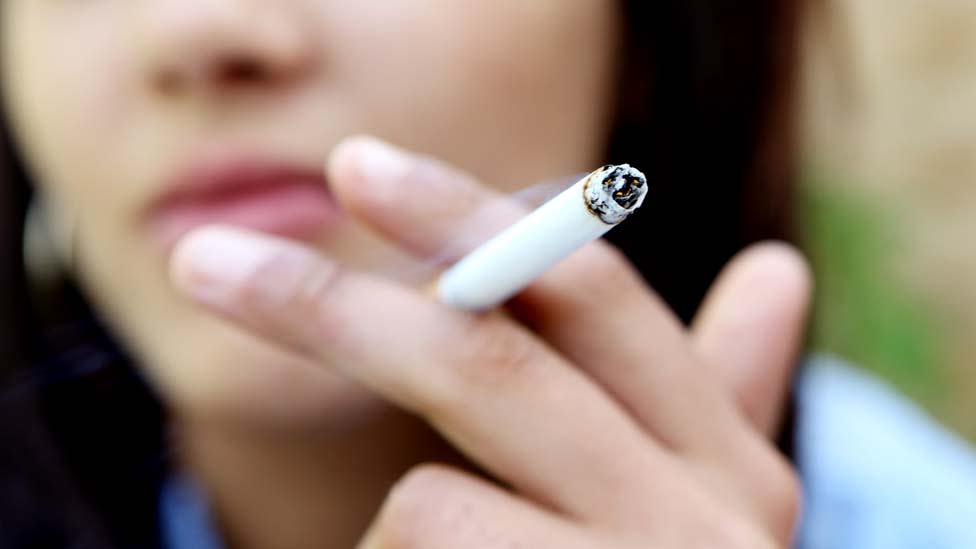MPs back smoking ban for those born after 2009

- Oops!Something went wrong.Please try again later.
- Oops!Something went wrong.Please try again later.
MPs have backed a plan to ban anyone born after 2009 from buying cigarettes, effectively ensuring it will become law.
The measures, championed by Prime Minister Rishi Sunak, survived despite opposition from several leading Tory figures - including two ex-PMs.
Health Secretary Victoria Atkins told MPs "there is no liberty in addiction" as she defended the plans.
The Tobacco and Vapes Bill passed by 383 votes to 67.
If they become law, the UK's smoking laws will be among the strictest in the world.
The UK's approach is thought to have been inspired by a similar law in New Zealand, which was later repealed after a change in government.
Speaking in the House of Commons, Ms Atkins said the plan would create a "smoke free generation".
However, several Tory MPs, including former prime minister Liz Truss, voted against the bill, arguing it would limit personal freedom.
Last week, ex-prime minster Boris Johnson called the smoking ban "absolutely nuts" during a speech at a Conservative conference in Ottawa, Canada.
"When the party of Winston Churchill wants to ban cigars, donnez-moi un break as they say in Quebec, it's just mad," he said.
Read more about the smoking ban
Conservative MPs were given a free vote on the bill, meaning they were not ordered to vote with the government. But full support by Labour's front bench ensured the measures passed.
There are still several more steps needed before it becomes law, such as votes in the House of Lords, but it is possible that the bill could now become law before the general election, expected in the second half of 2024.
Labour's shadow health and social secretary Wes Streeting accused Mr Sunak of "putting the bill at risk" by granting a free vote "because he is too weak to stand up to the Liz Truss-wing of his party".
"If we are privileged enough to form the next government, Labour will implement this ban, so young people today are even less likely to smoke than they are to vote Conservative," he added.
In total, 178 Tory MPs voted to support the plan but 57 voted against, including Business Secretary Kemi Badenoch and Conservative Party Deputy Chair Jonathan Gullis.
Foreign Office minister Anne-Marie Trevelyan also signalled her opposition but ultimately abstained on the vote.
She was one of some 106 Tories listed as having "no vote recorded", including Penny Mordaunt, the leader of the House of Commons.
Not all those listed in this way will have abstained, as some will have received permission to miss the vote.
Lee Anderson, an ex-deputy chair of the Conservative Party who defected to Reform UK last month, also voted against the bill.
Mr Sunak used his conference speech in October of last year to unveil his plans to ban people born after 1 January 2009 from buying tobacco products.
'Free society'
The debate on Tuesday was MPs first chance to debate the legislation implementing the ban.
Ms Truss was one of the first to speak against the bill, telling the House of Commons it risked infantilising people.
"It is very important that until people have decision-making capability while they are growing up that we protect them but I think the whole idea that we can protect adults from themselves is hugely problematic."
Her concern was echoed by some of her fellow Conservative MPs.
Former immigration minister Robert Jenrick, tipped as a potential contender to run for the Tory leadership, also came out against the policy.
On social media he said he was against the bill because he "believes in personal freedom".
"I also believe in the principle of equality under the law. A phased ban of smoking would be an affront to that," he added.
Former minister Sir Jake Berry said he was more concerned about "the addiction of the government to telling people what to do" than he was about people addicted to nicotine.
"I want to live in a free society where I am free to make both good and bad decisions."
Ms Atkins said she understood their concerns about "banning things" but defended the bill arguing: "Nicotine robs people of their freedom to choose."
"The vast majority of smokers start when they are young, and three quarters say that if they could turn back the clock they would not have started."
Earlier in the day, England's chief medical officer Sir Chris Whitty said once people become addicted to smoking "their choice is taken away".
He said: "When I was a junior doctor doing surgery I remember the tragedy of seeing people, whose legs had had to be cut off because of the smoking that had damaged their arteries, outside the hospital weeping as they lit up because they were trapped by addiction - that is not choice."
Tobacco use is the UK's single biggest preventable cause of death, killing two-thirds of long-term users and causing 80,000 deaths every year.
On top of that, a patient is admitted to hospital with a smoking-related condition, such as heart disease, strokes and lung cancer, almost every minute in England.
The bill also aims to make vapes less appealing to children, with new restrictions on flavours and packaging.
Trading standards officers would also get new powers to issue on-the-spot £100 fines to shops selling tobacco or vapes to children, with all the money raised going towards further enforcement.
Figures show that one in five children has tried vaping despite it being illegal for under-18s, while the number of children using vapes has tripled in the past three years.


